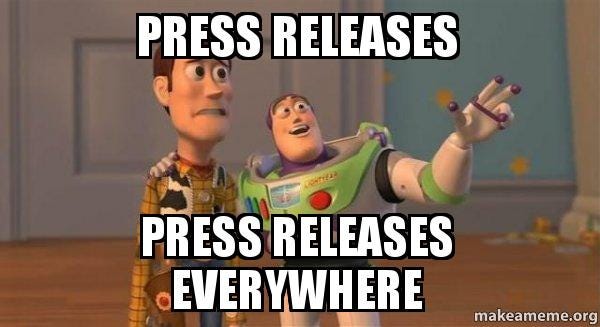There’s nothing worse than making a great game and then having it do a powerslide right under everyone’s radar. That’s just one role of the games media—helping to make sure good games get seen by the people who’d best appreciate them.
Today we’re gonna be taking a look at our own tips on how to write good press releases—the bread-and-butter of communicating with games media and making sure your game gets seen.
NOTE: This feature was originally released as part of the GamerBraves Newsletter. Subscribe to access features like this before they’re published to the GamerBraves website.
Respecting your Media Partners
One of the most important things you’ll need to do is understand the media’s point of view here. While contacting the right outlet to promote your game might be the most important day of your marketing cycle, for many media, it’s Tuesday.
The truth of the matter is we will get scores of press releases in a day, so you’ll need to really make a strong impression to not only catch our eye, but also stick a mental note.
“Didn’t we get a press release today for some really cool dating sim with Dark Souls gameplay?”
The other thing to remember is that contacting the media and dating have a lot in common- ultimately, the media don’t owe you anything.
It’s a harsh truth, but sometimes you can super personalize your approach to the media, only to have them ignore it entirely. It’s no one’s fault, sometimes we have our own editorial considerations to make and your game might just not make the cut.

Editorial Freedom
One problem that we thankfully don’t encounter as much is the publisher/PR company that’s too pushy.
Look, we get that you have your own goals to hit, but firing off on the first email demanding coverage isn’t a good look.
With the exception of embargoed news, you shouldn’t really demand any particular publish time for an article, nor should you suddenly start demanding the links to be sent back to you. It’s fine to say something like:
“Hey if you could send us the published link when it’s up, that’d be great for our records”
But going:
“Here is our press release. Publish it tomorrow at noon and send me the link when it’s up”
Is just pointlessly hostile. Remember, we’re all on the same team here.
Be Upfront
Also like a date, it pays to be upfront with what you want out of your media relationship. If you want more than to just hand us a press release (like an interview or review coverage), just say so.
Many publishers can feel the need to be coy about it, beating around the bush. At the end of the day, your potential media outlets are all busy people, and we appreciate the upfront-ness. Think of it as if it cost actual money to send an email, every email that isn’t confirming or denying some sort of content is basically wasted here.
“Hi, here’s our press release for Elden Sakura Robot Wars- Revengeance. The HD assets are here.
In addition, would you be interested in interviewing Hidetaka Del Toro-Mikkelsen, the game’s director? Please let us know and we can set something up”
Be Honest
Above all else, please don’t try to lie about your game to the media. We will find out about it, and it’s a good way to get blacklisted.
Several months back, a company approached us with a press release for a game that was pitched as Diablo, but with anime girls. As fans of both these things, our editorial team was jazzed to write it.
However, there was one hitch—the press release was light on assets. Since they were kind enough to tell us the name of the game, it was no problem though- after all, I just had to look up the game’s website, and there it was.
It was a porn game.
The game got no coverage, and all it did was make me waste a perfectly good writing timeslot.
It’s not just content either—media are more connected than you think, and we’d know if things like exclusive coverage end up not as-advertised.
Ultimately, we want to maintain a trusting relationship—and that means meaning what you say. If we have to spend time guessing how much of what you say is true, that’s the sign of a group we won’t like working with.
The technical side of things
Of course, if every press release were the same, there are lots of ways to make yourself do better with the media- one of these is being more convenient.
Like I said earlier, we can get through a lot of press releases in a day. Here are some things you can do to make sure writing yours goes smoothly:
Readily available assets: We love good, HD assets. Expecting us to just save it from the PDF document is a bit too many steps of abstraction, and worse still if that image ends up being too compressed.
File Size Is Important Too: That being said, maybe cool it with the 8k assets. At the end of the day we only have so much bandwidth, and serving 100 visitors 8k photos does no one any favours since the website will cough like it needs a swab test. Manually having to downsize your assets is a lot more of a hassle, too, so definitely give us assets we can immediately upload to our website if you want your assets seen.
Our Dream Assets Folder: Typically, a max of 1080p would be great for any kind of key art- big enough that it’ll look great on most screens, but also not so huge as to take a bite out of our RAM while editing (Side note, we can have up to 5 image files open at once, imagine if they were all 8k. My laptop would do a great impression of a convection oven).
Also, logo-less versions or transparent logos are a godsend! These are great for editing into our own custom thumbnails, so if you have these assets know that they’re always welcome here.
Clearly Marked Embargoes: We want to follow your embargo timelines as much as you do, but that means making sure we can see the embargo clearly. Try to have the embargo as visible as possible by including it in the Subject Line and at the top of every document (like the press release).
Also, it helps if you know more about the outlet you’re approaching. For example, GamerBraves operates in a GMT+8 timezone, so it helps if you convert the timeline for us, since many people not plagued by things like Daylight Savings won’t always have the sense to double check if you mean PDT or PST, et cetera.
What We Learned:
- Be concise in telling us what you expect from games media
- Remember we don’t owe you anything—if our schedules are too busy we’ll have to drop some stories and that’s no one’s fault.
- Don’t lie or you’ll end up an anecdote in a newsletter article as an example of what not to do










![[EXCLUSIVE] Inside Japan’s Indie Game Revolution – An Interview with BitSummit Organizer Masahiko Murakami](https://cdn.gamerbraves.com/2025/05/BitSummit-Orgainzer_Interview_FI-360x180.jpg)
![[EXCLUSIVE] The Art of Adaptation: Developer Interview Details the OVERLORD Mobile RPG Lord of Nazarick](https://cdn.gamerbraves.com/2025/05/Lord-of-Nazarick_Interview_FI-360x180.jpg)
![[EXCLUSIVE] Taking Gundam in Bold New Directions – Interview with GQuuuuuuX Director Kazuya Tsurumaki](https://cdn.gamerbraves.com/2025/04/Kazuya-Tsurumaki_Interview_FI-1-360x180.jpg)


![[SEA Exclusive] From Shadows to Shipwrecks – Jennifer English Talks About Bringing Emotional Depth to Clair Obscur: Expedition 33](https://cdn.gamerbraves.com/2025/04/Clair-Obscur-Jennifer-English_Interview_FI-360x180.jpg)

![[EXCLUSIVE] Do the Game Interview – An Intimate Look at the Challenges of Game Development](https://cdn.gamerbraves.com/2025/04/Do-the-Game_Interview_FI-1-360x180.jpg)
![[EXCLUSIVE] Interview with the Minds Behind of Den of Wolves – 10 Chambers’ New Sci-Fi Heist FPS](https://cdn.gamerbraves.com/2025/04/Den-of-Wolves_Interview_FI-360x180.jpg)











![[GUIDE] SD Gundam G Generation Eternal Unit Tier List](https://cdn.gamerbraves.com/2025/04/SD-Gundam-G-Generation-Eternal-Tier-List_Review_FI-360x180.jpg)
![[GUIDE] Clair Obscur: Expedition 33 Tier List – From Gustave to Verso: Who Deserves Your Party Slot?](https://cdn.gamerbraves.com/2025/04/Clari-Obscur-Expedition-33-Character-Tier-List_Guide_FI-360x180.jpg)

